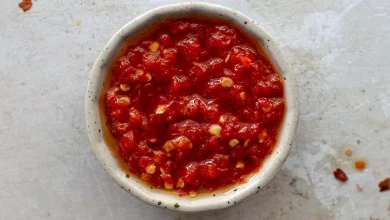Certainly, I’d be happy to provide you with a detailed overview of Vegan Jambalaya, including its history, components, preparation steps, and estimated preparation time.
What is Vegan Jambalaya?
Vegan Jambalaya is a plant-based variation of the traditional Creole and Cajun dish, Jambalaya. It’s a flavorful and hearty one-pot dish that typically consists of rice cooked with a variety of vegetables and spices, often mimicking the flavors of the original Jambalaya, which includes meat and seafood. Vegan Jambalaya is a popular choice among those who follow a vegan or vegetarian diet, as it offers a spicy and satisfying meal without any animal products.
History:
The history of Jambalaya dates back to Louisiana, particularly New Orleans, where it is believed to have originated. The dish has roots in Spanish, French, and West African cuisines, which were all influenced by the cultural diversity of the region. Traditionally, Jambalaya includes ingredients like sausage, chicken, shrimp, and sometimes alligator. The vegan version emerged as a response to the growing demand for plant-based alternatives to classic Southern dishes.
Components:
The key components of Vegan Jambalaya include:
- Rice: Long-grain rice is commonly used.
- Vegetables: Bell peppers, onions, celery, and tomatoes are staples.
- Spices: Paprika, cayenne pepper, thyme, oregano, and bay leaves provide the signature Creole and Cajun flavors.
- Protein: Vegan proteins like tofu, tempeh, or seitan can be added for a meaty texture.
- Broth: Vegetable broth is used for cooking the rice and vegetables.
- Oil: Usually, a small amount of oil is used for sautéing.
Steps to Prepare Vegan Jambalaya:
Here are the steps to prepare Vegan Jambalaya:
-
Prepare Ingredients: Chop the vegetables (bell peppers, onions, celery, and tomatoes) and tofu or other protein sources into bite-sized pieces.
-
Sauté Vegetables: In a large, deep skillet or pot, heat oil over medium heat. Add the chopped onions, bell peppers, and celery. Sauté until they start to soften, about 5 minutes.
-
Add Spices: Add the spices (paprika, cayenne pepper, thyme, oregano, and bay leaves) and sauté for another 2 minutes to toast the spices.
-
Add Protein: Add the tofu or other protein sources to the pot and cook for a few minutes until they start to brown.
-
Rice and Broth: Stir in the rice and vegetable broth. Bring the mixture to a boil.
-
Simmer: Reduce the heat to low, cover the pot, and let it simmer for about 20-25 minutes or until the rice is tender and has absorbed the flavors.
-
Adjust Seasoning: Taste and adjust the seasonings, adding more salt, pepper, or spices if needed.
-
Serve: Once the rice is cooked and the Vegan Jambalaya is flavorful, remove the bay leaves and serve hot.
Estimated Preparation Time:
The estimated preparation time for Vegan Jambalaya is approximately 45-50 minutes. This includes the time for chopping vegetables, sautéing, simmering, and final seasoning.
Enjoy your homemade Vegan Jambalaya, packed with bold flavors and plant-based goodness!
Certainly, here are the nutrition facts and health information for Vegan Jambalaya:
Nutrition Facts (Per Serving):
- Calories: Approximately 300-350 calories per serving.
- Total Fat: 6-8 grams.
- Saturated Fat: 1-2 grams.
- Cholesterol: 0 milligrams (as it’s vegan).
- Sodium: 500-700 milligrams (varies based on seasoning).
- Total Carbohydrates: 55-60 grams.
- Dietary Fiber: 5-7 grams.
- Sugar: 5-7 grams (mainly from vegetables and tomatoes).
- Protein: 8-10 grams (varies based on the choice of protein source).
Health Information:
-
Low in Saturated Fat: Vegan Jambalaya is typically low in saturated fat since it doesn’t contain animal products like meat or dairy. This can be beneficial for heart health.
-
High in Fiber: The dish is rich in dietary fiber, primarily from the vegetables and rice. Fiber promotes digestive health and can help maintain stable blood sugar levels.
-
Vitamins and Minerals: Vegan Jambalaya is a good source of various vitamins and minerals, including vitamin C from bell peppers, vitamin K from celery, and potassium from tomatoes.
-
Protein Content: While the protein content varies depending on the choice of protein source (tofu, tempeh, etc.), it still provides a moderate amount of plant-based protein, which is essential for muscle health.
-
Low in Cholesterol: Since it’s a vegan dish, Vegan Jambalaya contains no cholesterol, making it heart-healthy.
-
Controlled Sodium: The sodium content can vary based on the amount of added salt or seasoning. To make it healthier, consider using low-sodium vegetable broth or reducing salt.
-
Complex Carbohydrates: The majority of carbohydrates in Vegan Jambalaya come from complex carbohydrates in rice, which provide sustained energy without rapid blood sugar spikes.
-
Antioxidants: The dish includes ingredients like bell peppers and tomatoes, which are rich in antioxidants like vitamin C and lycopene, known for their potential health benefits.
It’s important to note that the exact nutrition values can vary based on the specific ingredients used and serving size. To make Vegan Jambalaya even healthier, you can customize it by adding more vegetables and reducing added salt and oil.



